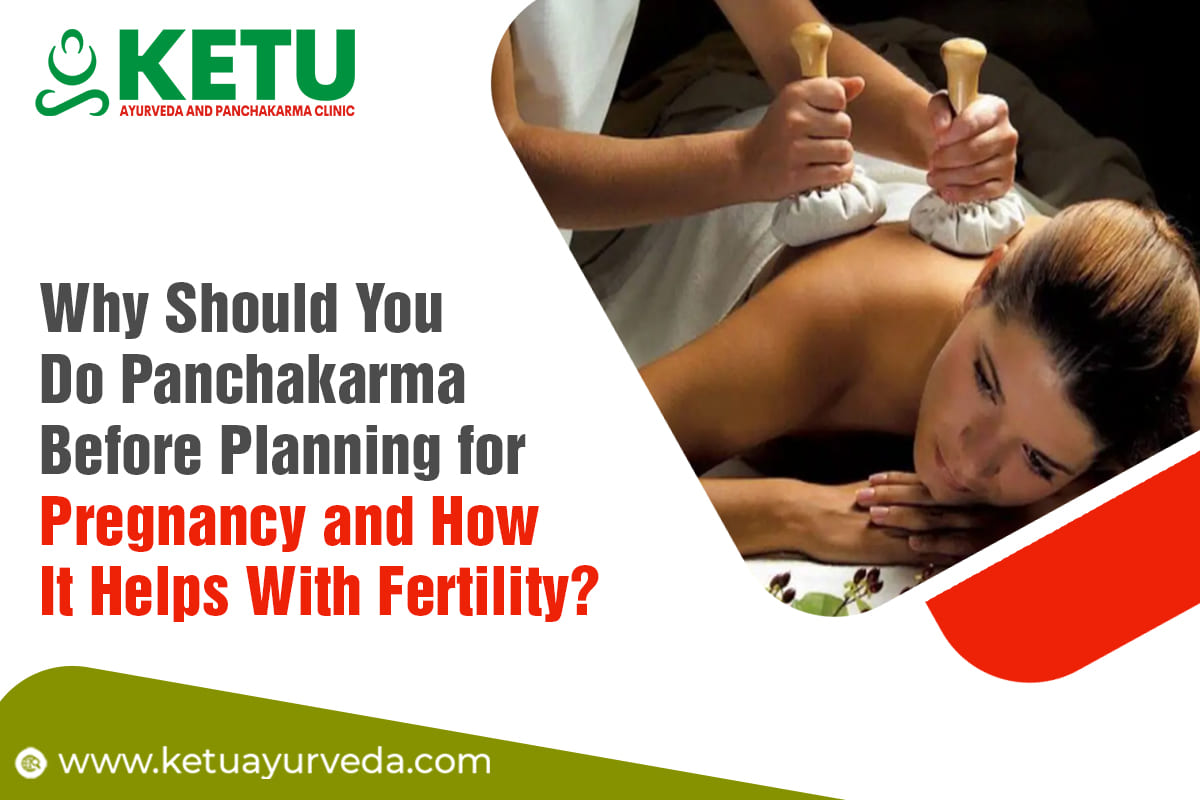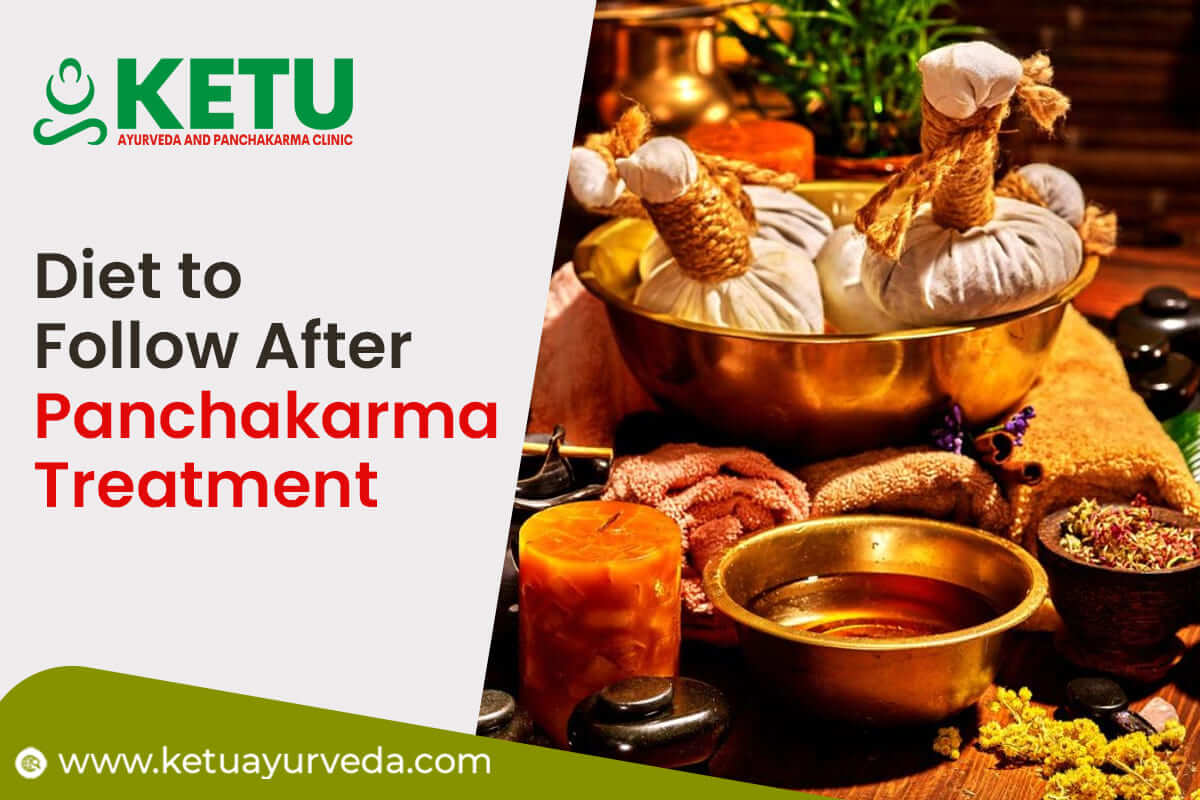Pregnancy is a huge decision that takes careful planning; however, in recent times, many women have faced infertility issues due to myriad reasons such as stress, unhealthy lifestyle, hormonal imbalance or other reasons. Ayurvedic treatments such as Panchakarma can significantly improve fertility and contribute to overall health.
What is the Diet After Panchakarma Treatment?
According to Ayurveda, fertility can be due to an imbalance in doshas. At Ketu Ayurveda and Panchakarma Clinic, our MD Ayurvedic doctor in Rajkot assesses different aspects of a patient’s bodily constitution (Prakriti), lifestyle, diet and current hormonal imbalance to identify the root cause of fertility issues.
Factors Contributing to Fertility Issues
- Imbalance of Doshas
According to Ayurveda, an imbalance in doshas can lead to issues in conceiving in different ways. For instance, when Vata dosha is triggered, it can impact the reproductive system by causing dryness, lack of nourishment in reproductive tissues and irregular menstrual cycles. Excessive Pitta dosha leads to inflammation, hormonal imbalance and increased bodily heat; all these factors affect the reproductive fluids. In case of excessive Kapha dosha can cause dampness and congestion that involves the movement of reproductive fluids and is unfavourable for pregnancy.
- Accumulation of Toxins
The accumulation of toxins over a period of time can negatively impact the body and block reproductive channels. Panchakarma treatment is needed to cleanse and eliminate the toxins and purify the body, improving the chances of conception.
- Digestive Health
Excessive digestive fire and poor digestion can lead to the accumulation of toxins and interrupt the absorption of nutrients that can impact the reproductive system.
- Poor Diet
Poor diet dietary choices, such as excessive consumption of processed foods and excessive spicy hot or cold foods, can contribute to imbalances.
After identifying the factors contributing to fertility issues, our Ayurvedic doctor in Rajkot prescribes the necessary steps to address these issues, ensuring a personalized and caring approach to your fertility concerns.
Why Should You Do Panchakarma Before Planning for Pregnancy and How It Helps With Fertility?
Panchakarma is a comprehensive Ayurvedic therapy that aims to eliminate toxins, promote relaxation and address the root cause of imbalance to enhance fertility. It provides a holistic solution to your fertility concerns. Below are some benefits of Panchakarma treatment for pregnancy:
- Detoxification: It eliminates the accumulated toxins from the body that are beneficial for reproductive health, as these toxins can disrupt the functioning of reproductive organs.
- Balances Doshas: Panchakarma therapies aim to balance the bodily doshas that are crucial for reproductive health.
- Nourishing Reproductive Tissues: For this basti therapy, a medicated enema is recommended. It improves the quality of semen and supports healthy reproductive health.
- Addressing Specific Issues: Panchakarma therapies are tailored based on a person’s specific dosha imbalance, fertility concerns and health condition.
- Preconception Care: Ayurvedic therapies are also used as preconception care to proactively prepare the body for a healthy pregnancy and overall health.
How Does Panchakarma for Pregnancy Planning Work?
As per Ayurveda, the first step towards conceiving is ensuring the Agni (metabolism) is functioning optimally. For this, the accumulated toxins need to be flushed out from the body and balance the doshas.
Step 1: Preparation & Pre-detoxification
The pre-detoxification process involves internal and external cleaning methods. This is due to the fact the body moves toxins to the digestive tract and releases them through sweating and other methods. In the internal cleaning methods, medicated ghee is ingested on an empty stomach to purify the body, which can take 3 to 5 days. After this, the external cleaning process known as ‘Swedna’ takes place. During this, medicated oil is applied to the entire body and later taken into the steam chamber while the head is left outside the chamber. The body is sealed inside to eliminate toxins through sweating.
Step 2: Detoxification
After the pre-detox steps, the patient ingests medicated herbs to eliminate toxins from the body by passing stool.
Book a Panchakarma Treatment Before Planning for Pregnancy
Panchakarma treatment has proven to be a great therapy supporting and promoting fertility by cleansing the body, balancing doshas, and creating the right environment for a healthy conception. It is a holistic approach to fertility issues. At Ketu Ayurveda and Panchakarma Clinic, we personalize therapies to meet individual requirements. For more information on fertility treatments and therapies, visit our clinic in Rajkot.
Check:- Why the Best Ayurvedic Doctors Are Advocating for Natural Healing?


